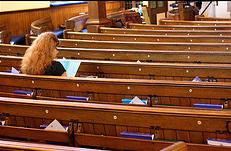 By Daniel Burke, Religion News Service
By Daniel Burke, Religion News Service
(UNDATED) Episcopal bishops from the six states that have legalized same-sex marriage are requesting permission to adapt their church’s venerable prayer book for use at same-sex weddings. The proposal presents a new challenge to the Episcopal Church as it seeks to balance respect for gay rights with fellow Anglicans’ widespread condemnation of homosexuality. The request from bishops in Connecticut, Iowa, Maine, Massachusetts, New Hampshire and Vermont will be debated at the Episcopal Church’s upcoming (July 8-17) General Convention in Anaheim, Calif.
Even though the Episcopal Church has taken a liberal stand on gay issues, including installing an openly gay bishop of New Hampshire in 2003, its rules and liturgy continue to define marriage as between a man and a woman.
The bishops’ proposed resolution asks for permission to offer a “generous and flexible response” to same-sex couples seeking to be wed in the six states that have legalized same-sex civil marriage.
“Right now the state’s definition of marriage and the church’s definition of marriage are in conflict,” said Bishop Stephen Lane of Maine, where gay marriage became legal in May. “We’re asking for some flexibility to adapt the prayer book so a blessing could be made for a same-sex couple.”
The Book of Common Prayer, versions of which Anglicans have used since the mid-1500s, contains three rites of marriage, said Lane, all of which address the betrothed as male and female. Revising those rites would require the assent of two consecutive General Conventions, meaning they could not be used until at least 2012. The Episcopal Church has not revised its Book of Common Prayer since 1979, according to church researchers.
But after a spring that saw five states legalize gay marriage in quick succession, the prayer book is out of step with civil law and the values of most Episcopalians, several bishops said. Gay and lesbian Episcopalians are asking why their church does not recognize their now-legal weddings.
New Hampshire’s openly gay bishop, V. Gene Robinson, said “bishops who live in dioceses where (gay) marriage is or will soon become legal face a real pastoral difficulty. Members of our churches want to avail themselves of this.” Robinson himself wed his longtime partner last June.
Bishop Alan Scarfe of Iowa said dozens of gay and lesbian couples have approached his diocese since the state’s Supreme Court legalized marriage in April. “I changed from being one who thought that civil unions were the way to go, then I heard the equal marriage argument,” he said.
But some Episcopalians say changing the marriage rites would violate the will of the larger Anglican Communion, a worldwide fellowship of churches of which the Episcopal Church is the U.S. branch. A majority of Anglicans worldwide denounce homosexuality as a sin and have asked Episcopalians not to authorize rites for blessing same-sex unions.
“If we move forward, even in this limited way, we will in effect have said `no’ to the Anglican Communion,” said Bishop Edward Little of Northern Indiana. “I think it will be tragic. It will make it very difficult for us to continue as full members of the communion and we will continue to lose parishes and people.”
Four dioceses and dozens of parishes have seceded from the Episcopal Church since Robinson was elected in 2003. In June, they launched the rival Anglican Church in North America, which seeks recognition as an official member of the Anglican Communion.
“If we move in the wrong direction at General Convention it would probably accelerate the number of people and parishes that would move into the new structure,” Little said.
Others said the bishops are trying to skirt the rules by asking for a change to the Book of Common Prayer without going through the normal amendment process.
Not so, said Bishop Tom Ely of Vermont. He said he has asked his priests not to use the Book of Common Prayer in blessing same-sex unions, which have been legal in Vermont since 2000. State lawmakers legalized gay marriage in April.
“If we wanted to do an end run around the process,” he said, “we would just do it without having any conversations or sharing our situation.”
Dioceses in other states across the country have proposed dozens of resolutions related to gay rights scheduled to be debated at the General Convention. Some seek to remove a de facto ban passed at the 2006 General Convention on any more gay bishops; others ask for churchwide rites for same-sex blessings.
“Let’s acknowledge the truth,” Robinson said. “Blessings of same-sex unions are going on in every diocese of the Episcopal Church. We know that for a fact. Sometimes with the blessing and knowledge of the bishop, and sometimes without his knowledge. What we’re suggesting is that we be honest with ourselves and the (Anglican) Communion about it.”
Disclaimer: Articles featured on Oregon Report are the creation, responsibility and opinion of the authoring individual or organization which is featured at the top of every article.

